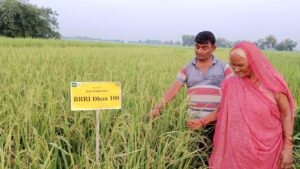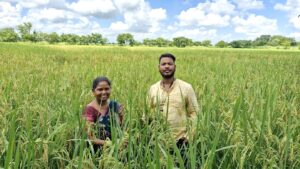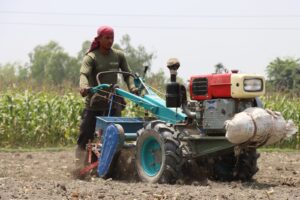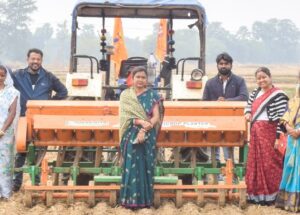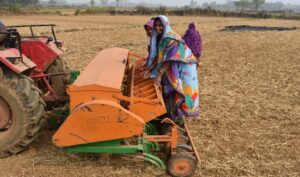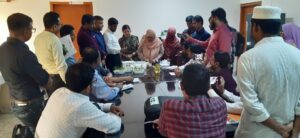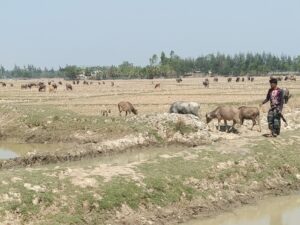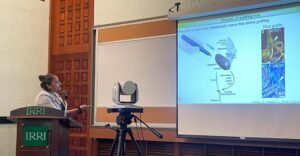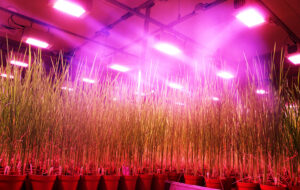Thomas Hargrove, Robert Huggan, Dao The Tuan, and Michael Way—four giants in the world of agriculture and development—were lost to us all within a 28-day period in January-February 2011. Respectively, two were cutting-edge international agricultural communicators, one a professor-agriculturalist-scientist in his home country of Vietnam, and one an international champion of integrated pest management (IPM). In their respective disciplines, all had important ties to rice at various times in their careers.
The two communicators had a profound influence on my own life and career. Tom Hargrove, long-time editor and head of the International Rice Research Institute’s (IRRI) Communication and Publications Services (CPS; 1973-91), brought me from Iowa State University to IRRI in 1982-83 as a visiting editor. During this time, he introduced me—up to then, I was still a Midwestern U.S. farm boy who had never seen rice growing in the field—to the worldwide importance of this staple grain and the overall significance of international agricultural communication.
Bob Huggan, Tom’s successor as head of both IRRI’s Information Center and CPS (1993-97) and a senior advisor in public relations (1997-98), brought me back to IRRI in 1995 for a longer stay—now 16 years and counting—during which time I’ve made an attempt to fill the shoes of these two prolific and often larger-than-life personalities who preceded me.
Tom Hargrove—international agriculturalist, author, and adventurer
Tom, 66, passed away unexpectedly on 23 January in his native Texas. He was a mentor, colleague, and friend to many, not only at IRRI but also at the International Center for Tropical Agriculture in Colombia, the International Fertilizer Development Center (IFDC) in the United States, and many other places around the world. He was an amazingly prolific writer and editor. He turned his 1994-95 death-escaping experience as a kidnap victim of FARC guerillas in the Colombian mountains into a best-selling book, Long March to Freedom, which was a source for the Hollywood movie Proof of Life .
He served in the U.S. Army during the Vietnam War, bringing along IRRI’s Green Revolution rice variety, IR8. He wrote much about this particular experience in his book A Dragon Lives Forever: War and Rice in Vietnam’s Mekong Delta, and in two subsequent feature articles in Rice Today (see Breeding history and I remember Honda rice).
Tom later discovered that a strain of rice, Carolina Gold, found along the Amazon was brought by Confederate soldiers from South Carolina who immigrated to Brazil after the Civil War. He traced an odyssey that spans Asia, Africa, and North and South America and writes of it in his final contribution to Rice Today, Carolina Gold and Carolina White: a genetic odyssey.
During his 18 years at IRRI, he had an intimate connection with the scientists, pictured above at right with World Food Prize Laureate and Principal Scientist Gurdev Khush in the 1980s. Indeed, Tom conducted and published his own rice research on the use of cross analysis to predict the genetic composition of improved rice varieties.
On the communications front, he pioneered innovative designs, procedures, and policies for multilanguage publication in agriculture, and conducted workshops on promoting the concept. As a result, hundreds of thousands of IRRI-promoted pocket field guides have been produced for farmers and extensionists to read and use in their native languages. For example, between 1983 and 2010, Field problems of tropical rice, has had 12 printings in English and numerous other languages, numbering more than 405,000 total copies. The co-publication effort also included the phenomenally popular A Farmer’s Primer on Growing Rice, of which 48 editions have been published in 40 languages in more than 20 countries, making it among the world’s most widely published agricultural books.
Ed Price, director of the Borlaug Institute and associate vice chancellor for international agriculture at Texas A&M University, and long-time colleague and friend, points out that Tom was also an adventurer. “He not only took new rice varieties to Vietnamese farmers during the war in which he fought (already mentioned), but he also scuba-dived for the lost Philippine town of Taal and helped restore bean cultivars to Rwanda after the genocide there,” said Dr. Price. “No one could have a more loyal friend than Tom. He stayed in touch as he chronicled each new finding, and connected each dot. His miraculous survival of 11 months captivity by the FARC guerillas in Colombia must have called upon formidable strengths that none other of us can fathom or understand. Tom was bigger than life, and thus he remains with us.”
View an excerpt from my IRRI pioneer interview with Tom (see video below) on 21 June 2008 and read more about him in a 24 January 2011 article in the Houston Chronicle.
Bob Huggan—communicator with a human touch
Bob, 79, passed away on 15 February in Montpellier, France, after a lengthy illness. He was an expert in public awareness, donor relations, appropriate dissemination of scientific research results, research and development communication, cross-cultural communications, and information management.
A Canadian, Bob had previously served as associate editor (public affairs) and deputy director, Communications Division, International Development Research Centre, Canada (1980-87); director of information and communications, World Agroforestry Center, Nairobi, Kenya (1987-90); and head of information and communication, International Network for the Improvement of Banana and Plantain, Montpellier, France (1990-93). He was also a visiting professor, Institute of Development Communication, University of the Philippines, Los Baños (UPLB, 1993-98).
He earned his master’s degree in journalism in 1982 at Carleton University, Ottawa, Canada. He was an inspirational teacher and communication strategist in the agriculture and development arena and a colleague and friend to many throughout the world. In addition to being a strategist, he was a hands-on person who relished opportunities to mingle with visitors to IRRI, explaining to them the latest Institute innovations, such as the new rice plant type, as shown in the mid-1990s photo.
IRRI Director General Robert Zeigler, a staff plant pathologist at IRRI when Bob was here in the mid-1990s, writes: “Bob came in to fill Tom’s enormous shoes and did so in a way that both charmed and reassured. He also inspired and put us on the right track that has served us well. Bob’s vision about what quality communications meant, his understanding that our targets were not just scientists, but everyday folks, and his seeing long before the rest of us that the Internet would grow into a powerful vehicle for IRRI (our first Web presence dates from his days in leadership at IRRI) have earned him a special place in IRRI history.”
Paul Mundy, a development communication specialist based in Germany, writes: “I first met Bob when he was at IRRI and I was at the International Institute for Rural Reconstruction (IIRR), two institutions destined to be forever confused because of their similar acronyms. Together with the International Center for Living Aquatic Resources Management, then based in Manila (now the WorldFish Center in Malaysia), we organized an occasional get-together of our communication departments. Like a true communication professional, Bob was very willing to spend time sharing the IRRI communication unit’s latest initiatives. But, unlike so many professionals, he really cared—not only about getting his message across but also about the people he was talking to.”
In retirement, Bob had been a consulting writer, editor, and translator, primarily in Europe and Africa. Writes Mundy: “I worked with him on various other occasions after we had both left the Philippines. We produced a book on public awareness together with IIRR and CTA (Technical Centre for Agricultural and Rural Cooperation) in Kenya, and we taught courses on communication and public awareness in Uganda, St. Kitts, and Grenada. In all these cases, Bob not only imparted his deep experience in a humble, charming, and amusing way. He also showed he cared deeply that the students understood and could practice what he was talking about.”
See more tributes to Bob Huggan.
Prof. Dao The Tuan—professor,academician, administrator, and rice breeder
Prof. Tuan, 79, passed away unexpectedly on 19 January in Hanoi. He was the former director of the Vietnam Academy of Agricultural Sciences (VAAS) ; ) and had strong partnership ties to IRRI throughout the Institute’s long and fruitful relationship with Vietnam.
Just last November, during the International Rice Congress (IRC), he was a “whirlwind” of activity, meeting with numerous participants during the 3-day event. He is pictured consulting with Dr. Zeigler during a Congress session break.
I sat next to him during the opening session of the Congress and he relayed to me how happy he was that his home country was hosting the 3rd IRC, with the largest attendance ever for such an event.
During his funeral on 22 January, Cao Duc Phat, Vietnamese minister of agriculture and rural development, said: “We lost a great scientist who always contributed frank opinions that were full of wisdom. Colleagues lost a big brother, students lost a dedicated teacher who cherished them, and the farmers lost a great friend.”
Prof. Tuan was known as the “father” of many highly productive rice varieties in Vietnam and he built a scientific foundation for intensive rice cultivation that garnered yields as high as 10 tons per hectare as early as the 1970s, which is explained in his book High-yield rice physiology. His research was applied widely, paving the way for the Green Revolution in Vietnam.
Professor Tuan published 19 books during his long career and he wrote more than 300 scientific articles: 206 in Vietnamese, 58 in French, 36 in English, and 5 in Russian.
Michael James Way—entomologist and IPM champion
Professor Way, 89, passed away in England on 18 January after a short illness. The world lost a great man and an IPM champion who devoted most of his life’s work to developing IPM methods to rationalize and reduce insecticide use, mentoring students, and helping and nurturing scientists in developing countries. He had served on the FAO Panel of Experts on Integrated Pest Control and participated in numerous missions to develop IPM in Asia and Africa.
Professor Way was an inspiration to many entomologists throughout the world, especially those involved in IPM. His contributions to ecologically based insect management are enormous and far ranging.
According to IRRI senior scientist K.L. Heong, from 1992 to 1999, Professor Way, then retired, was an occasional consultant/visiting scientist at IRRI. “He spent 3 months a year away from the UK winter to wade through hot and muddy rice fields in Victoria, Laguna, Philippines. He worked with me to understand the role of bunds in the rice ecosystem.”
During that period, Professor Way, with Dr. Heong, produced the classic 1994 paper in the Bulletin of Entomological Research on the Role of biodiversity in the dynamics and management of insect pests of tropical irrigated rice. “This work and the ideas it developed have formed the scientific foundations of the ecological engineering approach that is now promoted in IPM,” concludes Dr. Heong (view Dr. Heong’s full tribute to Prof. Way).
More on Prof. Way in The Telegraph (U.K.)
______________________________
Mr. Gene Hettel is the editor-in-chief of Rice Today

